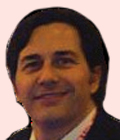
|
Lorenzo Bigagli
Earth and Space Science Informatics Laboratory
Institute of Atmospheric Pollution Research
Italy
Biography
Lorenzo Bigagli is a researcher at the National Research Council of Italy since 2006. His research focuses on ICT applications for Geospatial Sciences (Earth & Space Science Informatics), particularly addressing the gap between the scientific community and the society/decision makers. His academic background includes a Ph.D. in methods and technologies for environmental monitoring and a M.Sc. in software engineering. He is member of the European Geosciences Union and of the Open Geospatial Consortium (OGC), particularly as a co-editor of the Catalogue Services and the Publish-Subscribe specifications.
Abstract
Open Access to Research Data - Perspectives from the RECODE Project
Co-Author: Jeroen Sondervan, Senior Commissioning Editor, Amsterdam University Press
Many networks, initiatives, projects and communities are addressing the key barriers to Open Access to research data. These organizations are often heterogeneous and fragmented by discipline, geography, stakeholder category (publishers, academics, repositories, etc.) as well as other boundaries, and often work in isolation or with limited contact with one another. The RECODE project, started in February 2013 with duration of two years, leverages existing networks, communities and projects to scope and address the challenges related to Open Access, dissemination and preservation of scientific data. RECODE has the objective to identify a series of targeted and over-arching policy recommendations for Open Access to European research data based on existing good practice. The project has undertaken a review of the existing state of the art and examined five case studies in different scientific disciplines: particle physics and astrophysics, clinical research, medicine and technical physiology (bioengineering), humanities (archaeology), and environmental sciences (GEOSS).
In particular, GEOSS has been an optimal test bed for investigating the importance of technical and multidisciplinary interoperability, and what the challenges are in sharing and providing Open Access to research data from a variety of sources, and in a variety of formats. RECODE has identified five main technological and infrastructural challenges: 1) Heterogeneity - relates to interoperability, usability, accessibility, discoverability; 2) Sustainability - relates to obsolescence, curation, updates/upgrades, persistence, preservation; 3) Volume - also related to Big Data, which is somehow implied by Open Data; in our context, it relates to discoverability, accessibility (indexing), bandwidth, storage, scalability, energy footprint; 4) Quality - relates to completeness, description (metadata), usability, data (peer) review; 5) Security - relates to the technical aspects of policy enforcement, such the AAA-protocol for authentication, authorization and auditing/accounting, privacy issues, etc. RECODE has also focused on the identification of stakeholder values relevant to Open Access to research data, as well as on policy, legal, and institutional aspects. All these issues are of immediate relevance for publishers and libraries, as dissemination partners, and researchers, as producers/users.
|

